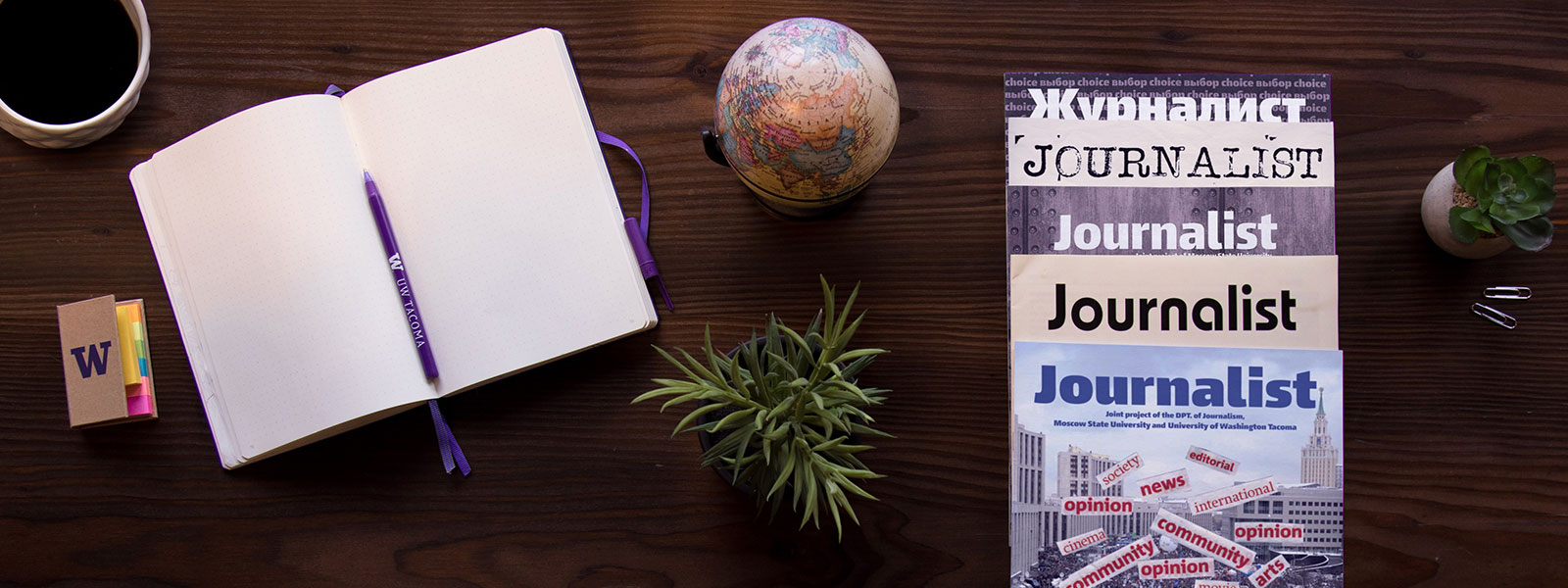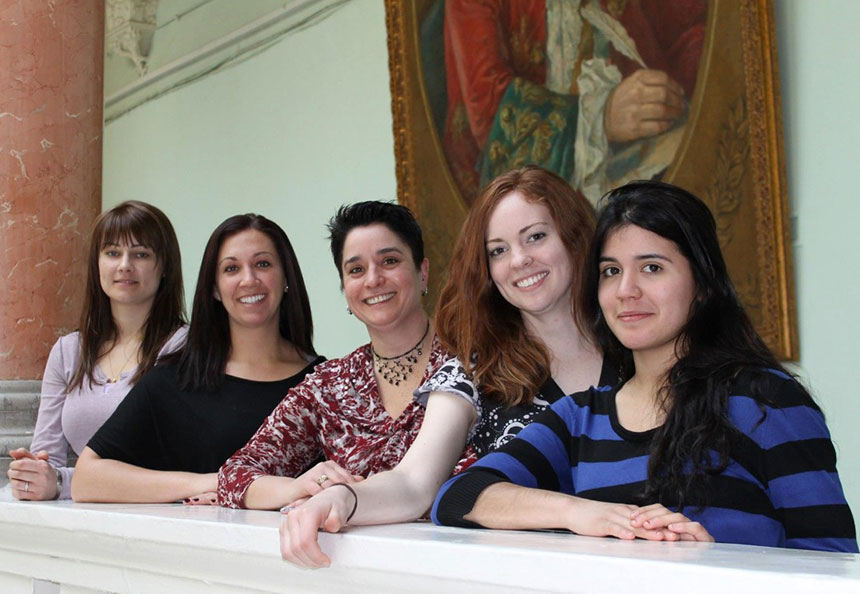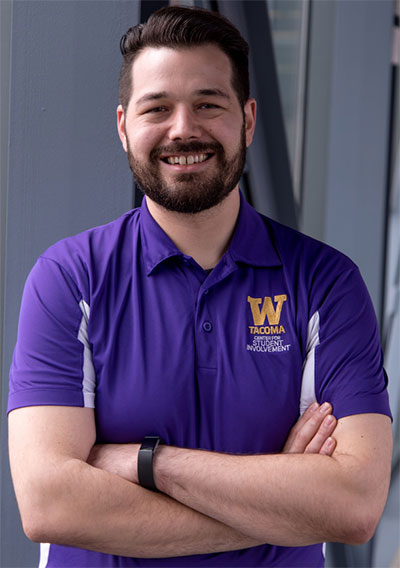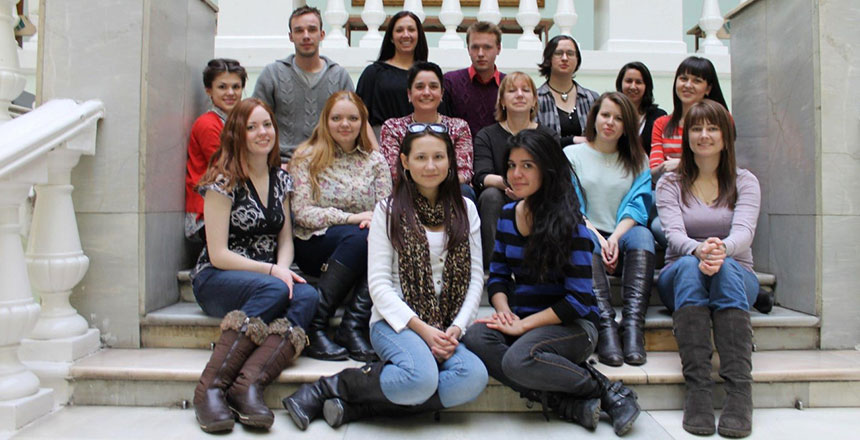
Journalism Without Borders
For more than a decade, students from Moscow and Tacoma have been working together to develop an international understanding of journalism.
This Section's arrow_downward Theme Info Is:
- Background Image: ""
- Theme: "gold-light-theme"
- Header Style: "purple_dominant"
- Card Height Setting: "consistent_row_height"
- Section Parallax: "0"
- Section Parallax Height: ""
The Digital Journalist
You can find PDFs of Journalist from 2003-2014 in the UW Tacoma Library Digital Commons.
The 2017 issue is on the web (as are 2008 and 2009).
This Section's arrow_downward Theme Info Is:
- Background Image: ""
- Theme: "light-theme"
- Header Style: "purple_dominant"
- Card Height Setting: "consistent_row_height"
- Section Parallax: "0"
- Section Parallax Height: ""
Dr. Chris Demaske received a phone call. The year was 2002, and she was an associate professor. On the other end, the director of Interdisciplinary Arts and Sciences (IAS) at the time shared an idea with Demaske. The University of Washington in Seattle was offering some funding for a pilot study-abroad program, and he wanted Demaske to assist in developing a proposal for a project in Moscow.
The program idea was inspired by the director’s interest as a Russian historian, and Demaske’s background in journalism and First Amendment scholarship. Demaske however, had little knowledge of Russia. “I’m a U.S. journalist and a First Amendment law scholar,” she said. “Everything I do is U.S. focused.” Still, she fashioned the proposal, which suggested taking two UW Tacoma students to Moscow State University (MSU) to participate in a joint journalistic experience with Russian university students. The proposal was approved. Not long after, two UW Tacoma students were selected through a competitive application process to accompany Demaske on this uncharted adventure.
Demaske partnered with Dr. Maria Lukina, an associate professor and deputy dean at MSU’s journalism department. The exchange proposal had a centralized focus: to create a comparative, cross-cultural journalism exchange, where students from seemingly different worlds could find common ground through their shared interest in the field. In partnership, the group of students from both universities were given a difficult task; they would spend one week in Moscow, creating and curating their own magazine, Journalist (in Cyrillic, the alphabet of Russian, it’s журналист).

Producing Journalist was no easy feat. Students had to not only generate their own stories, but also edit each other’s content, gather any material necessary to their stories and plan the magazine layout. The exchange acted as immersion into what it’s like to create a magazine, allowing the students only one week to create a cohesive, well-organized product. “For the students, this is their learning ground,” Demaske said. “To put together a magazine in a week with people you don’t know is pretty impressive.”
What was intended to be a one-time expedition to Moscow has since transformed into a near-annual trip, with either UW Tacoma students journeying to Russia, or MSU students traveling to Tacoma. Students from either home country act as hosts for the other. Program participants spend their time working on the magazine, helping organize the project or even giving tours of the surroundings foreign to their visitors.
Originally, Journalist was published in The Tacoma Ledger. Over time, it has transformed into a stand-alone print magazine, a web magazine and, most recently, a series of journalist long-reads for the web. “When we started to publish on our own,” Demaske said, “we had to piece together the funding from various sources in order to produce the print magazine. Publishing on the web allowed us to keep the cost down and teach our students a different set of journalist skills.”

According to Daniel Nash, who provides staff support for the Ledger and Tahoma West, his own expedition to Moscow allowed him to learn the value of challenging stereotypes. “Exposing me to another culture upended my expectations of that culture,” he said. “That’s a really valuable skill to have, the ability to be open to being wrong.” Nash went to Moscow as a junior, graduating from UW Tacoma is 2009. Participating in the journalism exchange program gave Nash experience that would later help him in his own career as a journalist. “I think doing the exchange prepared me for the intensity of work in journalism,” he said. After completing his communication degree, Nash worked at various news publications for eight years, until he returned to UW Tacoma for the student media specialist position.
Year after year, Journalist’s theme has changed depending on the current social climate, politics or media coverage. For example, its 2016 edition focused heavily on unity in the midst of the controversial U.S. elections. “You can really get a feel for the edition and see what the students are doing and interested in,” Demaske said.
The partnership between UW Tacoma and MSU has provided Demaske and her colleague Lukina with information vital to research they’re in the process of conducting, called Journalism Without Borders. In October, Demaske attended a conference at MSU to present on plans to further her and Lukina’s research, as well as its importance. Demaske and Lukina also received a Collaborative Online International Learning grant (COIL), which allowed them to translate their project into a classroom, so students who can’t study abroad can still experience a journalism exchange.

Through their work, Demaske and Lukina hope to exhibit how their collaborative journalism exchange embodies high impact practices (HIPs), or learning practices proven to have a high impact on students. “Certain things we engage students with are going to have a higher impact than others,” Demaske said.
Already, Demaske and Lukina have conducted a qualitative survey with a small sample of 20 students. They plan to expand the survey to more students who engaged with the program, either by traveling or via COIL. They hope that their research will not only reveal how their program had a long-term impact on those who participated, but also provide information to other institutions hoping to replicate the concept of their exchange. “We’re hoping this research will say ‘Okay, here’s the history of this project, here’s how it’s done, here’s how it’s fitting into these really good practices and you can do it too.’ ” Demaske said.
HIPs — which range from service learning to internships to capstones to teaching innovations — are essential to a college education because they contribute to cumulative student learning and the likelihood a student will persist through to graduation. “These are necessities for students to be successful,” Demaske said. In serving as such a practice, the study-abroad exchange between UW Tacoma and MSU not only prepares students by giving them a renewed worldview, it gives them a chance to encounter journalism in a different way. “The program gives student skills — not that they don’t get in the classroom — but they don’t get in the same way,” Demaske said.
Every study abroad program offers its own rewards. While no one could have predicted the growth of this journalistic exchange between UW Tacoma and MSU, for more than a decade it has provided students of both countries a chance to see just how much they have in common. “Pretty much universally, students say that this week changed the entire way they thought about the rest of the world,” Demaske said. “It made them recognize for all the political and cultural differences we might have, at the end of the day the students in Moscow have the same problems that the students here have.”
Recent news
Main Content
Gathering Strength
News Tags on this arrow_upward Story:
- None
Main Content
UW Tacoma Enrollment up 4% for Autumn 2024
News Tags on this arrow_upward Story:
- None
Main Content
Celebrating First Gen
News Tags on this arrow_upward Story:
- None



